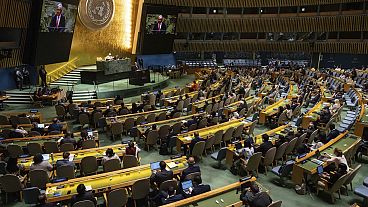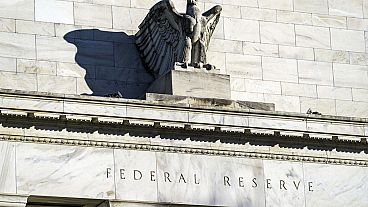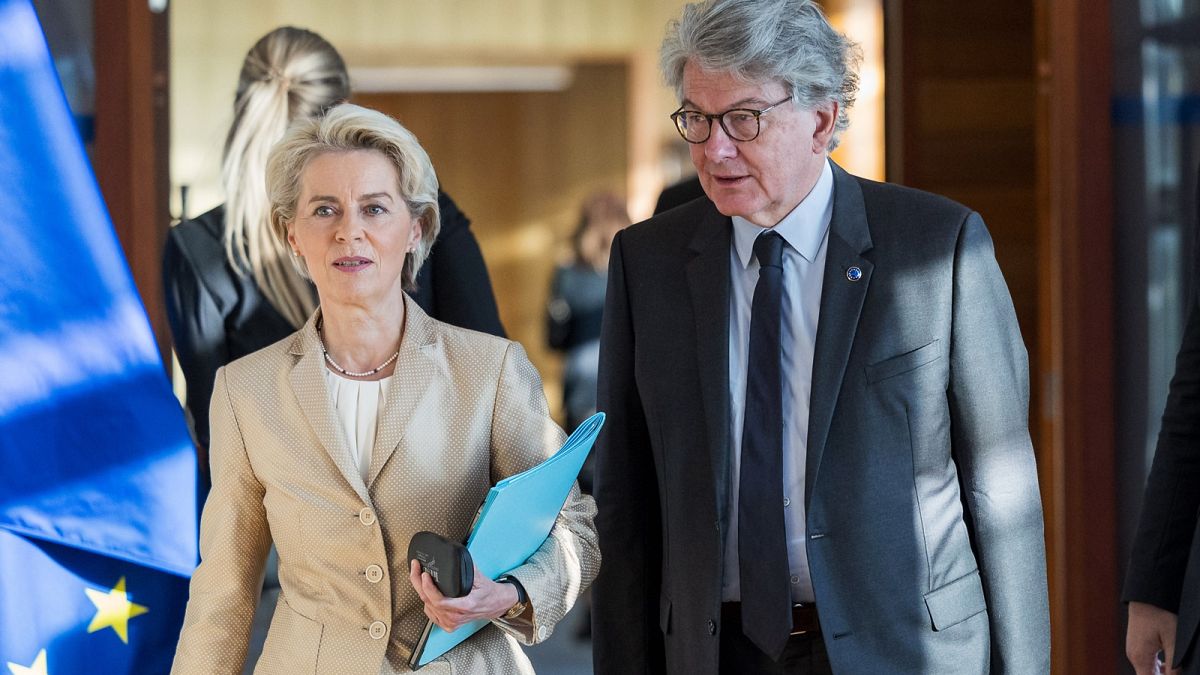The Frenchman's dramatic resignation sets the tone for Ursula von der Leyen's second mandate at the top of the European Commission.
Thierry Breton's arrival in Brussels happened amid a political earthquake of sorts: his name emerged in 2019 after the European Parliament rejected Sylvie Goulard, France's pick for European Commissioner, triggering a furious reaction from the Élysée Palace. The former Atos CEO then stepped into the fray, made it through the parliamentary grilling and snatched the powerful portfolio in charge of the internal market.
It is therefore befitting that Breton's exit occurs in a similar whirlwind.
In a scathing, no-holds-barred letter posted on X (a social platform he has launched probes against), the Frenchman announced his abrupt resignation and directly accused President Ursula von der Leyen of plotting against his re-appointment.
Until the early hours of Monday morning, Breton had been widely considered a shoo-in for a vice-president position in von der Leyen's second mandate, which is expected to focus heavily on the economy and competitiveness. Breton's regulatory work to rein the power excesses of Big Tech and boost the EU's manufacturing base, particularly on COVID-19 vaccines and military equipment for Ukraine, appeared like strong credentials to justify his ascendancy to a larger, horizontal portfolio.
From the onset of his term, Breton behaved like a one-of-a-kind Commissioner.
Drawing unashamedly from his background in the private sector, he adopted an outspoken, hands-on persona that combined matter-of-fact takes with lengthy monologues. Pictures of his many visits to factories across Europe became a regular feature on his social media. His way of working won plaudits and brought what many saw as fresh air to the humdrum, scripted politics of Brussels.
But his accomplishments, and the high profile he acquired as a result, failed to overcome his personal differences with his boss, which at first simmered behind closed doors and gradually spilled over into the open.
The first strong hint of how sour things have turned came in March, when Breton, in a late-evening message, lashed out against the centre-right European People's Party (EPP) for delivering half-hearted support for von der Leyen's re-election bid.
"The real question now: 'Is it possible to (re) entrust the management of Europe to the EPP for 5 more years, or 25 years in a row?' The EPP itself does not seem to believe in its candidate," he wrote.
The diatribe raised serious ethical questions, as it appeared to breach the executive's internal guidelines for the EU elections, which imposed limitations on Commissioners to avoid conflicts of interest and the politicisation of their offices. It also prompted accusations of disloyalty because Breton was undermining his boss's political standing.
The next major crack came in August after Breton, in his tireless crusade against Silicon Valley's market dominance, published a letter directed to Elon Musk ahead of the billionaire's interview with Donald Trump on X, the platform he owns. Breton reminded Musk of his obligation under EU law to prevent the amplification of harmful content and promised to "make full use of our toolbox" in case of wrongdoing.
The letter immediately backfired and triggered an outpouring of criticism against Breton for what was seen as an assault on freedom of expression and a blatant case of power overreach. The Commission quickly distanced itself from the debacle, saying that von der Leyen had no previous knowledge of Breton's pointed message.
'Queen Ursula' strikes back
This set the stage for his dramatic resignation and his explosive claim that von der Leyen had pushed President Emmanuel Macron to drop Breton as France's pick for European Commissioner in exchange for a loftier portfolio.
"You asked France to withdraw my name – for personal reasons that in no instance you have discussed directly with me – and offered, as a political trade-off, an allegedly more influential portfolio for France in the future College," Breton wrote.
The Commission did not confirm nor deny that von der Leyen had reached out to Macron, arguing these interactions were based on "trust and confidentiality."
Even more remarkable was Breton's parting shot against his boss, whom he blamed for "questionable governance." (The Commission refused to comment.)
MEPs weighed in on the row: Raphaël Glucksmann, a French socialist, praised Breton's legacy and called his departure a "very bad signal, both in substance and in form". Meanwhile, Dirk Gotink, from the EPP, said it was "quite ridiculous to torpedo the College formation process like this out of petty-personal grievances."
The effects of his resignation are already clear.
With Breton, a free-minded politician with a go-it-alone reputation, officially out of the picture, von der Leyen tightens her grip on the Commission and sets the tone for her new mandate: allegiance will be appreciated, dissent will not.
Buoyed by a stronger-than-expected majority, von der Leyen has no incentive to change her governance, which has been decried as excessively centralised and impenetrable beyond a select group of advisors. Her penchant for pristine communications and reluctance to enter controversies has earned her the nickname of "Queen Ursula," which her re-election campaign tried, and mostly failed, to debunk.
Breton was not the first to challenge the crown.
Frans Timmermans, the Dutch executive vice-president for the Green Deal, who was also known for speaking up his mind in blunt, unvarnished terms, left the Commission in 2023 to run for national office. By then, he had become the target of a vitriolic campaign led by the EPP and received little to no public support from von der Leyen.
Another candid character, High Representative Josep Borrell, who publicly chastised von der Leyen for her initial handling of the Israel-Hamas war, is nearing the end of his term and will soon leave Brussels. Nicolas Schmit, the lead candidate from the socialists, who ran against von der Leyen, will not stay either, even if he wanted to.
With the EPP poised to control the majority of positions in the next Commission, von der Leyen now appears unlikely to get push-back within her team on her strategy to tackle Europe's many woes.












